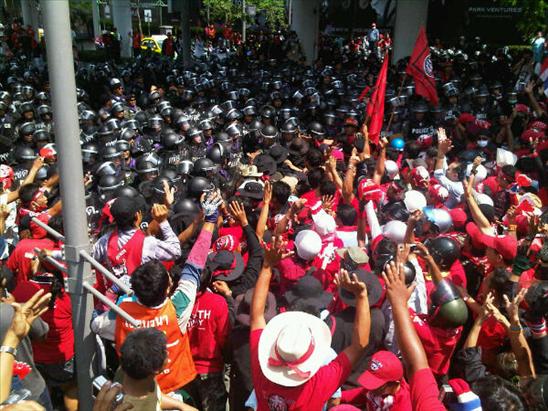Politics is colour-coded in Thailand so one can follow the movements as in a game of chinese chequers. The current protesters are known locally as the red-shirts. They mainly consist of the rural poor who had supported the former PM Thaksin Shinawatra and who are largely bankrolled by their leader-in-exile. A military coup was staged in 2006 that deposed Thaksin, rewrote the constitution and then allowed a fresh democratic election. Unfortunately for Thailand's oligarchy, Thaksin's former party won again! But democracy in Thailand is a fragile institution and the yellow-shirts started to destabilize the country with the aim of bringing down the newly-elected government. The courts eventually disbanded the ruling party on various cases of corruption and banned various members from holding office. This precipitated a change of guard without fresh elections. The yellow-shirts had won, so it was time for the red-shirts to play the same game. The current government in Thailand has no democratic mandate. Time for another showdown.
Democracy is fragile here, as I said; nobody wants to lose and nobody seems to tolerate losing. There is no patience to wait for the next elections. Losing is a trigger to destabilise the rule of the winners. The loyalty of the police and the army is also a complex function. Whereas the top brass are well-connected politically, the rank and file troops are largely from the provinces. We have seen this dynamic in many countries, such as former Soviet bloc nations, where the military refused to fire on citizens that they are supposed to protect. For the moment, they have limited their techniques to tear gas and water cannons.
Today is the first day of a 9-day holiday period with Thai New Year in the middle of next week. Everyone who can has fled to their holiday destination, but travelling in the opposite direction are more and more red-shirts, coming to spend their New Year in Bangkok. Yesterday's battle was over communications. The government blocked the broadcast signal from People's TV (PTV), the private station that has been broadcasting political messages, Thaksin interviews and issuing orders of where people should congregate. The red-shirts stormed the Thaicom offices yesterday, seemingly allowed to do so by the security forces, and had their PTV signal rebroadcast. But that seems to have been a short-lived victory as today it has been closed down again. We shall see if they take over Thaicom again.
Technology plays a big role in all protests these days: TV, radio, websites, mobile phones and twitter, all serve to keep the protesters informed of the next move in this cat-and-mouse game. They are also key targets for infiltration by the security forces - it is, after all, fairly obvious to follow the tweets of protest leaders. Encrypted emails sent by mobile would be the best method, at least between the organisers, but I am not privy to such information. What I do know is that the government is now also jamming mobile phone signals. Strangely, this may explain why my wife has been unable to contact anybody in her village this morning; she said it sounds like all phones are off! It would actually be easier and cheaper if the government ordered all mobile phone companies to cut their networks. The tit-for-tat in communications continues.
As I write this, I see a tweet that troops are amassing outside the UN building in Bangkok, so I suspect some communication has been intercepted as there are no protesters there, as yet. Below is a picture taken just a few minutes ago around Ploenchit, which has a Skytrain station and a major expressway intersection. People without guns lining up against people with guns rarely ends happily. Nobody really wants a full scale battle like in 1992, but the laws of escalation mean that nobody will climb down without both saving face in some way or other. One should also not discount double agents on both sides. Just as the red-shirts seem to have one or more moles within government, so there seem to be some agents provocateurs within the red-shirts ranks. There have been bombs thrown at government and military buildings, causing little damage but ratcheting up the tension. The aim of such "fake red-shirts" would be to discredit the whole movement by initiating violence.

One possible end-game is that this unelected government steps down and calls for fresh elections. Another round of Thai-style electioneering will thereby begin, with advertising budgets going directly to the prospective voters. However, Thailand can only claim to have a functioning democracy when the losers finally accept defeat gracefully. Until that time, democracy is just a word.



Comments